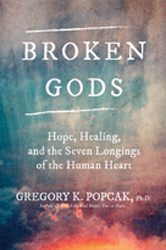Broken Gods, a new book by Gregory Popcak, an internationally recognized expert in Catholic pastoral counseling, begins by posing the potentially uncomfortable “what if” scenario: what if you woke up as a god? No, not THE God, but “a being who is perfect, whole, healed, and, yes, even immortal.” Some might find that offensive or even blasphemous. Others might consider it laughable and close the book. I found myself intrigued and read on.
The notion of God wishing us all divinization becomes a thread woven into the idea that there are seven divine longings of the heart which are all distorted in seven specific ways and can only be fulfilled by one of seven heavenly virtues. At first the concept is reminiscent of the English nursery rhyme riddle “As I was going to Saint Ives…” but soon the overview chapters move to focusing on each of the seven “triads” in depth. Each of the seven combinations of longing/distortion/virtue is discussed in it’s own chapter which ends with a prayer and an exercise to help the reader apply what s/he has learned to his/her own life.
I enjoyed this book thoroughly on many levels. As one who loves brain science, Dr. Popcak’s references to psychological concepts and theories added a fascinating dimension to the overall theme. It made for a more holistic view of religion and the topics addressed.
Even more so I appreciated the connections between the seven deadly sins and the associated longings. I’ve often found “unworthiness” and “sin” to be challenging concepts. Not in the absolute where particular crimes or behaviors would clearly be considered sins in most anyone’s moral view. Not in scenarios where behaviors or efforts are not worthy of one’s potential and in a Christian context not worthy of God. But in an everyday sort of way where we want to strive to do better without feeling defeated by our inherent “brokenness.” Broken Gods bridges that gap. For example, Popcak shows how the deadly sin of pride is a longing for abundance that can be satisfied through humility. When we see pride as a separation from God because we trust in ourselves more than in God it becomes clear how applicable it is to daily life. Recognizing this and linking it to a longing for abundance (specifically meaning, intimacy and virtue in our lives) allows us to choose another more fulfilling path. When we choose the path of humility whereby we share our gifts, nurture our relationships and look to learn from life, we move toward God and away from pride. As we make these shifts, we also move toward the divinization we were asked to imagine on page one of the book.
Broken Gods shows the reader, in practical ways, how to recognize, fulfill and heal our longings by “letting go and letting God.”
Read an excerpt from Broken Gods, and an interview with the author, at the Patheos Book Club here.













